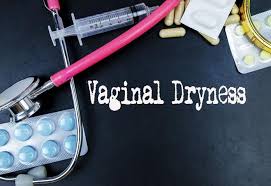Vaginal dryness is a hormonal disruption condition that prevents the lubrication of the vaginal walls. Therefore, hormonal imbalance in females is the prominent factor among the causes of vaginal dryness.(1,2)
During sexual intercourse, vaginal secretions cause normal vaginal lubrication. Age causes hormonal imbalance in women, especially after menopause.(3)
This hormonal imbalance causes the vaginal wall to thin and affect the moisture coat, resulting in vaginal dryness.(4)
Many women experiencing vaginal dryness often reside to the use of over-the counter vaginal moisturizers or estrogen therapy among other several treatments.
But, they should fast know what are the causes of this condition and try home remedies for vaginal dryness before other treatments.
Why am I dry down there all over sudden?
Causes of vaginal dryness vary from effects of medications, physiological and phycological factors, and chiefly hormonal changes among other causes.(5)
However, there are natural vaginal moisturizers and treatments for this condition.
What factors contribute to vaginal dryness?
1. Menopause

Vaginal dryness is one of the menopausal symptoms among other signs. Menopause is the natural end of a woman’s reproductive life when her menstrual cycle stops around the age of 40 and her ovaries stop secreting progesterone and estrogen hormones.(6)
Menopause is a condition of not having a menstrual period for more than a year. Infertility in many women begins in their late 30s, and this decrease in hormonal secretion causes vaginal dryness. (7,8)
Menstrual periods become heavier, longer, and shorter, and they may disappear for a month before reappearing or becoming more frequent than usual. (9)
The genetic factors cause the ovaries’ inability to produce optimal levels of progesterone and estrogen hormones. (10,11)
Less estrogen affects the amount of vaginal discharge which acts are natural vaginal moisturizer. The main cause of vaginal dryness is reduction in estrogen hormone levels.(12)
2. Breastfeeding

Breastfeeding is good for both babies and mothers. It is the most nutritious food for infants. It also has a number of positive health implications for mothers.
Breastfeeding has been linked to a lower risk of chronic disease development in both the mother and the child.
Breastfeeding alters the body’s hormones, particularly estrogen, and is a major cause of vaginal dryness. This is naturally occurring during child nursing.(13,14)
3. Depression
Depression is a serious mental illness that has a negative impact on how you feel, think, and act. It can be a single episode or recurring, and the severity can range from mild to severe.
Poor concentration, a sense of hopelessness, changes in appetite or sleep patterns are some of the other symptoms.
Depression can disrupt the body’s hormones, including estrogen and progesterone, resulting in vaginal dryness and other bothersome symptoms. (15,16)
A 2020 study found that there is a significant association between vulvovaginal atrophy and depression.
4. Tobacco Use
According to medical research, smoking women are more likely than others to experience vaginal dryness. Smoking results in hormonal imbalance and affects estrogen levels. (17)
The main risk of smoking is the harm it causes to one’s health, as smoking is one of the leading causes of heart disease, emphysema, cancer, and a variety of other health conditions.
Smoking has numerous negative effects on the body. Cigarette smoking can cause headaches, coughing, wheezing, sinus congestion, poor vision, heart disease, and stroke.
The World Health Organization (WHO) recently declared smoking to be the leading preventable cause of death in the world. Every year, it kills more than 8 million people.
A nicotine addict may continue to smoke despite the fact that it is known to be harmful to their health.
Tobacco smoke contains over 4,000 chemicals, dozens of which are carcinogens (cancer-causing agents) linked to lung cancer, heart disease, stroke, chronic bronchitis, emphysema, and other respiratory issues. (18,19)
5. Anxiety
Stress is defined in psychology as a feeling of strain and pressure caused by an adverse or extremely demanding circumstance.(20)
It is also a state of mental, emotional, or physical tension. Although stress can raise the risk of cardiovascular disease, it is not the only risk factor.
During stress, the sympathetic nervous system is highly stimulated, preparing the body for a state of defense decreasing supply to other organs like the vagina causing atrophic vaginitis.(21)
6. Immune system dysfunction
The immune system is a complex network of organs, nutrients, and cells that work together to protect the body from external invaders like bacteria, viruses, and fungi.
When your immune system fails to function properly, your body becomes more vulnerable to infection and disease which may cause vaginal dryness. A 2019 study found that HPV may cause vaginal atrophy.
7. Excessive physical activity
Excessive exercise may also result in a loss of appetite or even an eating disorder. Other effects of excessive physical activity include rhabdomyolysis, or the breakdown of skeletal muscle tissue.
Excessive physical activity can cause dehydration (vaginal dryness), burnout, fatigue, muscle soreness, and injury.
8. Cancer treatments effects on vaginal tissue

A cancer patient’s treatment may include surgery, chemotherapy, radiation therapy, hormone therapy, immunotherapy and many others.
A 2013 study found that vaginal dryness is aside effect of hormonal adjustment treatment in women with breast cancer. (22)
Radiation therapy and chemotherapy both cause menopause during or shortly after cancer treatment, but only direct radiation toward the ovaries.
Because radiation to other parts of the body does not cause menopause, it is considered a cause of vaginal dryness.(23)
9. Drugs that reduce vaginal discharge
There are some drug medications and therapies that cause vaginal dryness these include:
- Anti-estrogen drugs for uterine fibroids and endometriosis.
- Birth control medications like Yaz, Lo Ovral, and Ortho-Cyclen
- Medications for high blood pressure and heart disease
- Antihistamines for allergies and cold medications.
Sedatives, benzodiazepine and antiepileptic treatments results in vaginal dryness in some women.(24,25,26)
Replacement therapy and chemotherapy are both options of medications that may cause vaginal atrophy.
Calcium channel blockers and beta-blockers reduce blood supply to sexual organs, which is one of the many causes of vaginal dryness. Antihistamines cause vasoconstriction throughout the body, which reduces mucus secretion in the vagina, resulting in vaginal dryness.
These medications cause hormonal fluctuations and an imbalance of reproductive hormones such as estrogen and progesterone, which causes vaginal dryness.
10-Surgery
Oophorectomy causes immediate menopause, but symptoms and signs worsen due to the sudden loss of estrogen and progesterone hormones secreted by the ovary, so surgery is one of the causes of atrophic vaginitis.(27)
11. Non-cotton fabric pantie
Medical research suggests that women underwear’s should be pure cotton. This is because cotton fabric allows for circulation of air and also absorbs sweat that would otherwise irritate the vagina.
Here are common fabrics that you should avoid that can cause vaginal atrophy:
Rayon fabric
This is a fabric made from recycling of wood pulp. A lot of chemicals are used during this process to make it durable. Most of these chemicals are not friendly to the skin.
Nylon
These are petroleum materials with compounds like chloroforms, formaldehyde, limonene, sulfuric acid and terminal. The friction between these fabrics and the vaginal area are problematic to women’s health.
Acrylic
This fabric is linked to breast cancer cases in women. It’s also non-biodegradable and affects even the health of the environment.
Polyester
Polyester materials are linked to respiratory issues, skin problems and various cancers. They are made from very toxic chemicals.
12. Use of detergents on the vagina
Naturally the vagina makes fluids for its own self-cleaning. Therefore, there is no reason for using scented soaps in washing your vaginal area.(28)
These soaps are made up of various chemicals that will irritate the tender vaginal walls hindering normal physiological moisturizing.
These hygiene products are also made from various chemicals that affect the normal pH of the vagina and may cause vaginal dryness. For ideal vaginal health, use only clean water without using perfumed soaps and petroleum jelly. Minimize bubble baths and the use of mineral oil in vaginal lubrication.(29)
13. Vaginal Douching
In the cause number 12 above, it’s advisable that you only use water to clean the vagina. But, as usual avoiding soap alone is not ideal for the required state of vaginal health.
A 2013 study found that vaginal douching has severe effects to vaginal health. It may lead to vaginal inflammation disease, infections which results in dryness.
The far you should go when washing your private part is the vulva. Don’t extend your hand into the vagina for this may cause injuries to the delicate vaginal tissue making it dry.
Is vaginal dryness considered normal?
No, vaginal dryness is not normal, but it is a common condition that can be alleviated by healthy living. However, due to massive hormonal changes, most women will experience dryness after menopause.
Women who adopt healthy living habits and follow the NEWSTART health program have vaginal moisture for a longer period than their counterparts. Learn how to treat vaginal dryness without drugs.
How does vaginal dryness feel?
Symptoms of vaginal dryness are extremely inconvenient and embarrassing, so most women avoid seeking medical attention in order to avoid discussing their symptoms with medical professionals.
These symptoms differ from person to person and can be mild or severe. There are numerous symptoms of vaginal dryness, but the following are the most common:(30,31)
- Discomfort in the vaginal and pelvic regions.
- Recurrent and persistent urinary tract infections.
- A burning sensation in the vagina.
- Stinging and itchiness
- Extremely painful sexual intercourse.
- Loss of sexual desire.
- Aches and pains.
- Light bleeding and pain during sexual intercourse.
When to seek medical attention for treating vaginal dryness
Sometimes you maybe experiencing severe symptoms like hot flashes along side your vaginal dryness. In these instances you need to get advice from your doctor on the most effective treatments for your case.
Although many women feel embarrassed to disclose the fact that they suffer from dry vagina to health care professional there are times its advisable.
The doctor will do critical diagnosis and pelvic exam to suggest the best treatment options for your sexual problems.
Take away
Vaginal care is an important part of women’s personal hygiene because the vaginal area is a very sensitive region that requires special attention when dealing with it in order to keep it clean, hydrated, and free of dryness.
Personal hygiene is the practice of staying clean by upholding a high standard of cleanliness. To have healthy vaginal health, you must look into what you dress, what you wear and even moral practices.
The prominent use of female and male latex condoms in sex life may constitute to vaginal atrophy. The lubricants used on these latex materials have detrimental effects to the female organs with repeated use. you may find here natural ways for treating vaginal dryness.


Pingback: 17 Home remedies for itching vagina | GILEAD THERAPY
Pingback: Top 10 Home remedies for vaginal dryness | GILEAD THERAPY